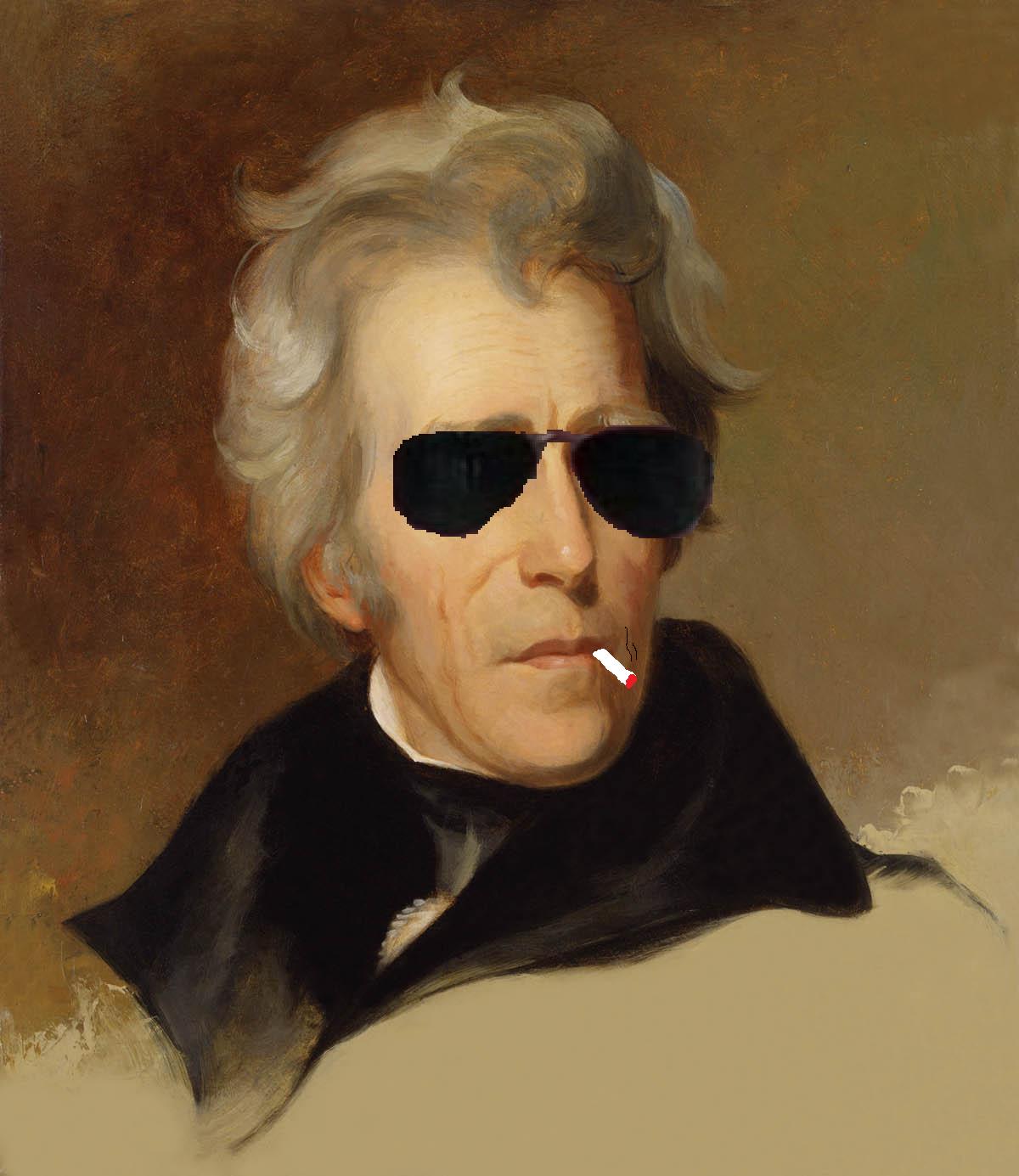Andrew Jackson Executive Order: The Untold Story And Its Impact
Let me tell you something about Andrew Jackson and his executive orders. This guy was no ordinary president. He had a way of shaking things up, and one of his most controversial moves was issuing executive orders that reshaped American history. If you're curious about how these orders impacted the nation, you're in the right place.
Andrew Jackson was the seventh president of the United States, but he wasn’t just another face in the crowd. Known as "Old Hickory," he was a man with a mission. His executive orders were like his personal stamp on the country, and they left a lasting mark. Some loved him for it; others, not so much.
But here's the thing—executive orders are powerful tools. They allow presidents to take action without waiting for Congress to get its act together. And Andrew Jackson? Well, he wasn't afraid to use them. In this article, we’ll dive deep into his executive orders, their significance, and why they still matter today.
- Rooster Teeth Controversy Unveiling The Truth Behind The Drama
- Siva Wife The Untold Story Behind The Woman Who Stole Our Hearts
Who Was Andrew Jackson?
Before we get into the nitty-gritty of his executive orders, let's talk about the man behind the orders. Andrew Jackson was born on March 15, 1767, in the Waxhaws region, which is now part of North and South Carolina. He grew up in tough conditions but rose to become one of the most influential figures in American history.
Early Life and Career
Jackson's early life was anything but easy. He lost both his parents at a young age and fought in the Revolutionary War as a teenager. Despite these challenges, he built a successful career as a lawyer and politician. By the time he became president in 1829, he was already a national hero thanks to his victory at the Battle of New Orleans.
Here’s a quick rundown of his early life:
- Does Miranda Get Married A Deep Dive Into Love Relationships And Everything In Between
- Skip The Games The Ultimate Guide To Building Trust In Relationships
- Born in a log cabin in the Waxhaws region.
- Lost his family during the Revolutionary War.
- Became a lawyer and later a judge in Tennessee.
- Served in the military, earning the nickname "Old Hickory" for his toughness.
Presidency and Legacy
As president, Jackson was known for his strong leadership style and willingness to challenge the status quo. He believed in a government that was closer to the people, and his executive orders reflected this belief. But his presidency wasn't without controversy. Issues like the Indian Removal Act and his fight against the Bank of the United States made him both admired and criticized.
Andrew Jackson Executive Order: The Basics
So, what exactly is an executive order? Think of it as a presidential directive that has the force of law. It allows the president to manage the operations of the federal government without needing approval from Congress. Andrew Jackson used this power to push his agenda and address issues he felt were urgent.
Why Did Jackson Use Executive Orders?
Jackson believed that the presidency should be a powerful office capable of taking decisive action. He saw executive orders as a way to bypass Congress when necessary and implement policies quickly. Some of his most famous orders include the "Specie Circular" and the removal of federal deposits from the Bank of the United States.
Here’s why Jackson relied on executive orders:
- He wanted to streamline government operations.
- He believed Congress was often slow and inefficient.
- He needed to address urgent economic and social issues.
The Specie Circular: A Controversial Move
One of Jackson's most controversial executive orders was the Specie Circular. Issued in 1836, this order required that all federal land purchases be made in gold or silver. The goal was to curb speculation and stabilize the economy, but it had unintended consequences. Many people couldn't afford to pay in specie, leading to a financial panic in 1837.
Impact of Andrew Jackson's Executive Orders
Now, let's talk about the impact of Jackson's executive orders. These weren't just political moves; they had real-world effects on the economy, society, and politics of the time. Some were praised, while others were heavily criticized. But one thing is for sure—they changed the course of American history.
Economic Impact
One of the biggest impacts of Jackson's executive orders was on the economy. By dismantling the Bank of the United States and issuing the Specie Circular, he aimed to promote a more stable financial system. However, these moves also contributed to economic instability, leading to the Panic of 1837.
Social Impact
On the social front, Jackson's executive orders had a profound impact on Native American communities. The Indian Removal Act, while not an executive order itself, was enforced through presidential directives. This led to the infamous Trail of Tears, where thousands of Native Americans were forcibly removed from their lands.
Andrew Jackson vs. Congress: A Battle for Power
One of the defining features of Jackson's presidency was his ongoing battle with Congress. He often saw Congress as an obstacle to his goals and used executive orders to bypass them. This tension between the executive and legislative branches set a precedent for future presidents.
The Bank War
Perhaps the most famous example of Jackson's clash with Congress was the "Bank War." He saw the Bank of the United States as a tool of the wealthy elite and worked tirelessly to destroy it. Through executive orders, he removed federal deposits from the bank and placed them in state banks, known as "pet banks."
Key Executive Orders of Andrew Jackson
Let’s take a closer look at some of the key executive orders issued by Andrew Jackson. These orders not only shaped his presidency but also had lasting effects on the nation.
Executive Order to Remove Federal Deposits
In 1833, Jackson issued an executive order to remove federal deposits from the Bank of the United States. This move was part of his larger effort to dismantle the bank, which he viewed as a threat to democracy. While it was controversial at the time, it ultimately succeeded in weakening the bank's influence.
The Specie Circular
As mentioned earlier, the Specie Circular required that all federal land purchases be made in gold or silver. This order was meant to curb speculation and stabilize the economy, but it had the opposite effect. Many people couldn’t afford to pay in specie, leading to a financial crisis.
Andrew Jackson Executive Order: The Legacy
So, what is the legacy of Andrew Jackson's executive orders? They set a precedent for future presidents to use executive power to achieve their goals. While some of his orders were successful, others had unintended consequences that affected the nation for years to come.
Positive Legacy
On the positive side, Jackson's executive orders helped strengthen the presidency and make it a more powerful office. He believed in a government that was closer to the people, and his actions reflected this belief. Many historians see him as a champion of democracy and a man who fought for the common person.
Negative Legacy
On the negative side, Jackson's executive orders contributed to economic instability and social injustice. The Panic of 1837 and the Trail of Tears are just two examples of the harm caused by his policies. These events remind us of the dangers of unchecked executive power.
Lessons from Andrew Jackson's Executive Orders
What can we learn from Andrew Jackson's use of executive orders? First, we see the importance of balancing executive power with congressional oversight. Second, we learn that even well-intentioned policies can have unintended consequences. Finally, we realize that the decisions of one president can shape the nation for generations to come.
Modern Relevance
Today, executive orders remain a powerful tool for presidents. They allow for quick action on pressing issues, but they also come with risks. The lessons from Andrew Jackson's presidency remind us to carefully consider the implications of executive power and ensure that it is used responsibly.
Conclusion: The Lasting Impact of Andrew Jackson's Executive Orders
In conclusion, Andrew Jackson's executive orders were a defining feature of his presidency. They reshaped the American political landscape and had lasting effects on the economy, society, and politics. While some of his orders were praised, others were heavily criticized. But one thing is clear—Jackson's use of executive power set a precedent for future presidents.
I encourage you to leave a comment below and share your thoughts on Andrew Jackson's executive orders. Do you think they were justified, or did they go too far? Let's keep the conversation going and learn from history together. And don’t forget to check out other articles on our site for more fascinating insights into American history.
Table of Contents
- Who Was Andrew Jackson?
- Andrew Jackson Executive Order: The Basics
- Impact of Andrew Jackson's Executive Orders
- Andrew Jackson vs. Congress: A Battle for Power
- Key Executive Orders of Andrew Jackson
- Andrew Jackson Executive Order: The Legacy
- Lessons from Andrew Jackson's Executive Orders
- Conclusion



Detail Author:
- Name : Ezequiel Conroy
- Username : icie77
- Email : muller.elroy@bartoletti.biz
- Birthdate : 1984-02-03
- Address : 14885 Schumm Light Apt. 732 Lake Watson, MN 66097-8679
- Phone : 1-731-200-4191
- Company : Kulas-Braun
- Job : Artillery Officer
- Bio : Autem voluptatum nemo impedit. Dolore a ex corporis ut et ut. Sed non aut assumenda. Ab illum illo nam praesentium magni.
Socials
tiktok:
- url : https://tiktok.com/@witting1992
- username : witting1992
- bio : Veritatis sit earum aut cupiditate. Modi quaerat temporibus fuga.
- followers : 3668
- following : 1801
linkedin:
- url : https://linkedin.com/in/rwitting
- username : rwitting
- bio : Id eius sint voluptas et dignissimos sed quia.
- followers : 413
- following : 2127
instagram:
- url : https://instagram.com/rosendo_witting
- username : rosendo_witting
- bio : Quidem nam dicta officiis voluptatum non eveniet. Explicabo eum et quaerat amet ipsam quibusdam.
- followers : 3530
- following : 2726
facebook:
- url : https://facebook.com/witting1970
- username : witting1970
- bio : Dolor itaque eos magni quod. In eum eius quo ducimus et quo dolorem.
- followers : 6841
- following : 2276